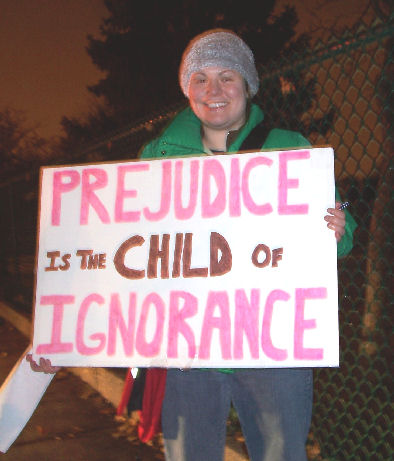If you are a compulsive business card collector, please stop it. Handing out your business card to 50 people you talked to for about thirty seconds each, not only makes you look self-serving and desperate, it also sends off a clear message that you’re most likely going to spam people with your newsletter, resume or webinar invites. This means you and your communications are likely to be considered spam and sent to a place that will get you blacklisted in more ways than one. There was a guy in Chicago who did this at practically every event in town and was on so many blacklists that I’d been warned about him repeatedly weeks before I even encountered him.
What do you do when you encounter someone like this? If they shove their card at you, go ahead and accept it so that you’ll know to keep an eye out for them in the future, but don’t feel like you need to give them a card in return. Just smile and say thank you, but if they ask for a card, and you don’t want to give them one because you know nothing about them or how you might be able to collaborate with them, just say, ‘I’m sorry, but I’m almost out and I have another event to go to,’—which at some point you will—smile and move on.
Don’t Be a Hit and Run
Make an effort to stay in touch or in occasional contact with folks you meet with whom you want to stay connected. Make notes on the back of the business cards they’ve given you about what they need help with or what their interests are. Then continue to pay attention to things that matter to them. This is the way to create quality connections and trusted new contacts.
For example, after you have followed up with a new acquaintance, and are now perhaps linked on LinkedIn or BizNik, when you notice updates or changes in their status, go ahead and message or email them to comment on their change. It might be congratulations if you notice a new job,
name change (perhaps they got married) or maybe a promotion. Or, if you know they’re looking for a new opportunity or hinted that they would be soon, it might be to offer a suggestion about a good job board you spotted in their field or to connect them to someone new you have met.
And, if you see that a contact is traveling or moving to a new town, offer to connect them to whomever you may have a quality connection with there.
Also, be sure to reach out to people when you don’t need anything. Networking is about creating, nurturing and building relationships, and they need care and feeding. The whole idea is about not waiting until you need something to build a network; it’s about continually cultivating and engaging in that network. The wider your network, the more people you know whom you’ve worked with. This also implies that all these people know the kind of person you are and the work you do.
ACTION:
Notice or learn something new about 3 of your current contacts this week. Look at their personal or company website or online activities to see what they’re up to and if you can offer encouragement or support or a congrats, do so. Be sincere though; don’t just go through the motions!
Don’t Waste Your Time
Remember, have a goal or goals so you don’t waste your precious time and energy. Don’t go to a networking event unprepared. As mentioned earlier, try to research the types of people who will be there, and the format of the event. Also, focus on making connections of quality, not quantity.
It’s also just as important to disconnect from the unproductive or overly opportunistic and one-sided networking relationships you’ll unfortunately come across. And, for the latter, often, just by association, you could attract more unwelcome attention or unwanted perceptions.
Don’t spend any more time on connections you make when you recognize that there’s a suspicious or questionable agenda, or they simply aren’t reciprocating or paying it forward. Just move on, and whatever you do, don’t take it personally. Today’s economy has many people coming from a slightly desperate position, and it’s best to just forgive their tactics and practice empathy when you can, but you don’t need to let others take advantage of you. Trust your gut and move on.
Like most folks I know, I’d much rather have someone, who’s not interested in building a quality connection with me, come right out and tell me they want to meet my brother-in-law (BIL), the head of Engineering at Motorola. It’s much better than them stalking my Connections list on LinkedIn, and then trying to reach him by dropping my name during a cold call or email. My BIL, of course, tells me about it, and then I have that person’s eyebrow-raising methods reflected on me (‘Nice friends, Sandy,’ he says). Not to mention that they will now likely have my bad mojo out there on them.
Please don’t misunderstand. I recommend being an ‘open networker’ in that you are open to helping people get what they are looking for; they just need to tell you what it is first and at least offer a two-way street if they can. I say be happy to connect with people if they manage to build a relationship through the getting-to-know-you process. Just don’t let people ‘leverage’ your contacts without your permission or take advantage of your generosity by trying to get for free what you actually charge others for.
ACTION:
Identify someone who is better than you at networking, and attend an event with him or her. And if you really want a good mentor (to your wingman), offer to pay their way to the event. Then watch the way they work the room, and their approaches. You will learn a lot by watching and listening and you won’t be any different than the other 80% of people in the room, who aren’t totally confident in their networking skills either.
Sandy Jones-Kaminski is
a self-described networking enthusiast and accomplished business
development professional. In 2002, Sandy launched her own partnership
marketing and biz dev strategy consulting practice called Bella Domain, LLC (http://www.belladomain.com).
She is also a recent VP of Networking for one of the largest chapters
of the American Marketing Association and author of the book, ‘I’m at a
Networking Event-Now What???’ Sandy knows how to make quality
connections, cultivate relationships, host some great networking
events, and create what she refers to as good ‘social capital.’ Read
the rest of her book and you’ll learn why you might want to consider
becoming a ‘pay it forward’ focused person, as well as how to be more
memorable while you’re out there working hard to maintain good standing
within your social networks (on-line or otherwise). You can connect
with her at www.belladomain.com ([email protected]) and buy her new book via Amazon (http://amzn.com/1600051669).
In the modern job search, the littlest of things can make a HUGE impact. There are tons of little things that go into making a successful online job search and the more you know the better prepared you can be when you see the ideal job posting.
Today, there are consulting services and career coaches with whom you can expect to spend thousands of dollars for advice; literally, thousands of dollars for career consulting, career coaching, interview coaching, resume consulting, personal brand coaching and much, much more.
But what about the rest of us, who are unable to spend the exorbitant sums needed for these types of services? What if I (the modern job seeker) have questions about my job search, my resume, and my upcoming interview?
The answer is MyOnlineCareerCoach.com.
For other great articles, check these:
Creating Your Position: Market yourself as the perfect candidate for your “dream job/career
Economic and Political Cartoons to Think About
Graphs, Stats; About the Economy
Don’t Be Like This Alpha Dog -Funny Tips for the Job Seeker
How Personal Branding Works and Its Affect on Your Job Search
- Share/Bookmark

 There’s a reason why there are laws against basing hiring decisions on factors like age, religion, race, gender, and sexual orientation: if there were no such laws, many hiring managers would use those factors all the time. Hiring for full-time employment is an exercise in prejudice—some of it inexcusable, and some of it necessary.
There’s a reason why there are laws against basing hiring decisions on factors like age, religion, race, gender, and sexual orientation: if there were no such laws, many hiring managers would use those factors all the time. Hiring for full-time employment is an exercise in prejudice—some of it inexcusable, and some of it necessary. We’ve seen the value of microblogging sites such as Twitter for sharing short ideas, links, and personal updates, but that kind of website is wayyy too public for business collaboration. (Think about all the secret projects, private sales figures, and other sensitive matters that you’d prefer everyone keep in nice, secure, private, trackable emails.) Nonetheless, there is a need for a new way to talk to colleagues — something informal, real-time, attention-based, and inclusive…. something a lot like, well, Twitter.
We’ve seen the value of microblogging sites such as Twitter for sharing short ideas, links, and personal updates, but that kind of website is wayyy too public for business collaboration. (Think about all the secret projects, private sales figures, and other sensitive matters that you’d prefer everyone keep in nice, secure, private, trackable emails.) Nonetheless, there is a need for a new way to talk to colleagues — something informal, real-time, attention-based, and inclusive…. something a lot like, well, Twitter.

